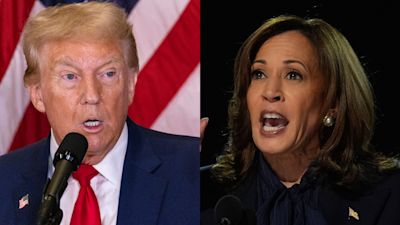Why Harris v Trump is one of the most crucial TV debates in history

The Harris v Trump debate could be the most consequential night of the campaign so far, as ITV News US Correspondent Dan Rivers reports
Words by ITV News Correspondent Ben Chapman
When Donald Trump and Kamala Harris walk out onto the debate stage in Philadelphia, it will be first time they have ever met.
They have never shaken hands, never said hello to each other before.
But their exchanges on Tuesday night, behind podiums and in front of the cameras, could determine which one of them wins the White House on November 5.
The debate, between a former president and a candidate who has only been in the race for two months, is certainly one of the most unusual in American history.
What is at stake?
The polls put this election on a knife edge.
The latest, from the New York Times, puts former president Trump on 48%, and Vice President Harris on 47%. Those are national numbers.
But in such a large country, this election will be decided by a relatively tiny number of undecided voters in a handful of swing states.
A series of CNN polls last week found the election too close to call in the crucial battlegrounds of Georgia, Nevada as well as Pennsylvania, where the debate is being staged.
For Harris especially, it is an opportunity to convince a huge TV audience of voters that she is up to the job.
She only entered the race when President Joe Biden dropped out in July - and many voters simply do not know enough about her.
She has enjoyed something of a honeymoon period over the summer.
But she has also largely avoided scrutiny, with one TV interview last week being her only unscripted appearance.
This is Trump’s chance to regain the momentum.
How will it work?
The debate will be televised live in prime time, starting at 9pm on America’s east coast (2am BST). It will last 90 minutes with two breaks for adverts.
There will be no studio audience, and the candidates will take questions from two moderators.
The candidates’ microphones will be muted while the other is speaking, a request made by Biden’s campaign when he was still in the race, to avoid Trump speaking over him.
But the rule may now help Trump, limiting chances for Harris - a former prosecutor - to cross-examine the former president.
What can we expect to hear?
Americans will be hoping to learn more about where the candidates stand on key issues including abortion rights, immigration and the state of the economy.
But personal jibes are almost inevitable.
In recent days, Trump has branded Harris a "marxist" and called her "stupid"; while Harris says she expects the former president to lie throughout the debate.
Trump arguably has the easier task. People already know what he stands for, and he is a past master at imposing himself on proceedings.
But Harris is a very different challenge for him. He will need to be careful not to turn off women voters by appearing to browbeat his opponent.
A Harris campaign insider has told ITV News she is preparing for one of two possible Trumps: one where he goes “off the rails” and not sticking to the facts; the other a more subdued version.
She has been trying out answers and soundbites that will play well on social media, and aims to expose Trump’s opposition to abortion rights.
She has sought the advice of Hillary Clinton, who Trump debated in 2016.
Harris won admirers in a debate against Vice President Mike Pence in 2020, when she chided him for interrupting her.
But she will need to convince Americans what she stands for.
Subscribe free to our weekly newsletter for exclusive and original coverage from ITV News. Direct to your inbox every Friday morning
How much does it matter?
Presidential debates are notorious for not having much impact. But this year is already an exception.
It was Biden’s rambling, incoherent performance against Trump in June that ultimately led to him dropping out.
It’s estimated that between 3% and 6% of people likely to vote in the election remain undecided.
This is not just the first chance to see their two options side-by-side. It may be the only one they get before election day.
Want an expert briefing on US politics and the presidential race? Listen to our latest podcast Talking Politics USA...